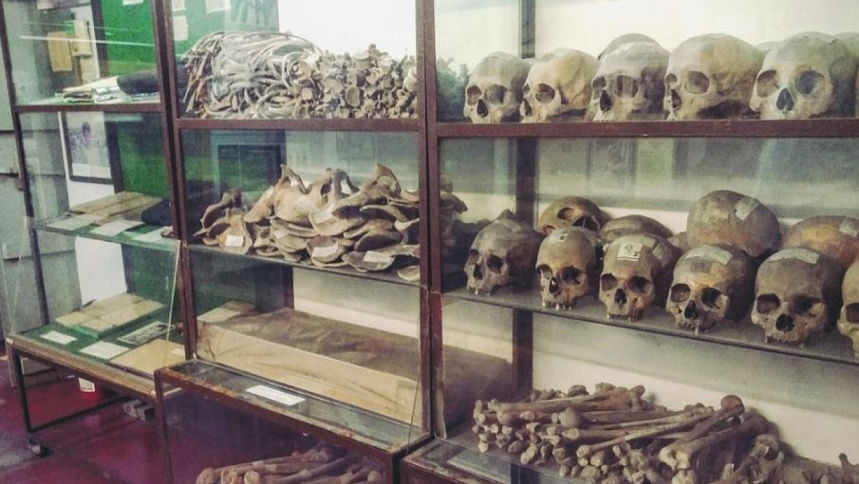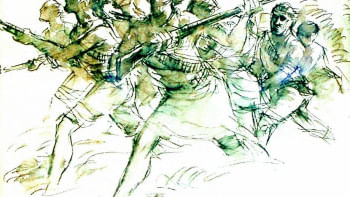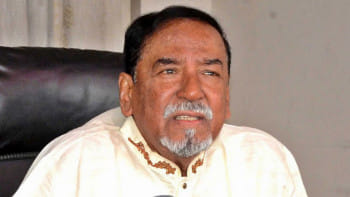Jamaat leader’s apology and the bigger question

It was during the Third Crusade that Richard the Lionheart fell dangerously ill. His condition worsened and the news reached his enemy, Muslim commander Salahuddin Ayyubi. Instead of taking advantage of the situation, Salahuddin sent his doctor to treat Richard and also sent snow to cool his fever. Salahuddin, who had liberated Jerusalem in 1187, said about Richard, "He is a noble foe. Let him not perish needlessly."
In another instance, the last Khwarezmian emperor, Jalal al-Din, made a defiant stand on the banks of the Indus (in what is now modern-day Pakistan) despite being vastly outnumbered with no hope of victory against Genghis Khan's army. Refusing to surrender to the Mongol onslaught, Jalal dived into the river with his horse and swam across under a hail of arrows. Watching the whole scene from a hilltop, Genghis, the great Khan, said, "Such a son is worthy of a father." (Baaper beta, as we often say in Bangla.)
History is replete with such instances of warriors admiring their worthy adversaries. There is a strange code of honour among soldiers who return from the battlefield. They seem to develop a strong sense of camaraderie not just with their comrades but also with their foes from battle. But the enemy within, who side with the invaders, have no such code. I realised this a long time ago from something my uncle once said.
He was among the first batch of officers to be inducted into the Bangladesh Army. Like many others from the First War Course (Murti Commission), my uncle soon found himself at the front, leading men to battle. He had learnt to kill almost as soon as he had learnt to shave. He had not even turned 20 when the war was over. Chachchu once said, "I don't mind sitting down to tea and a chat with those I fought against on the battlefield. But I will never be able to tolerate these people." He was referring to the vile collaborators who abetted the Pakistan Army in 1971.
It is well-established in documents and widely reported events that Jamaat-e-Islami, as a party, devoted itself to defeating the liberation forces in 1971. The party's leadership met with the Pakistani military commanders during the Liberation War pledging whole-hearted support for a unified Pakistan.
Jamaat and like-minded parties joined forces to set up vigilante militias like the Razakars, Al-Badr, and Al-Shams to act as auxiliary forces of the military junta. Jamaat leaders spearheaded the Razakar units, while the erstwhile Islami Chhatra Sangha's leaders were put in charge of Al-Badr units. It was the atrocities of these vigilantes against unarmed civilians and non-combatants that evoke the strong sense of betrayal we still feel. Despite being born here and despite being Bangalees, they turned and sided with the Pakistani military junta. In many areas of Bangladesh, it was these groups who helped identify the families and homes of the liberation forces and Hindus who would later be taken away, tortured and, often, executed.
The Jamaat chief of that time, Ghulam Azam, spearheaded the East Pakistan Reclamation Committee after Bangladesh's independence in 1971. In his bid to "reclaim East Pakistan," he travelled around the world to build opinion against Bangladesh and urged countries not to recognise us as a country. A direct disciple of Jamaat's founder Abul A'la al-Maududi, Ghulam Azam ran his anti-Bangladesh propaganda in England, United States, Turkey, Saudi Arabia, and Libya up until 1977, before relenting and finally settling down in Bangladesh.
Together with Al-Badr, Al-Shams and the Razakar, Jamaat members were instrumental in providing support to the Pakistan Army and wreaking havoc on civilians. They murdered and pillaged, they raped and looted. Fast forward 54 years, a recent verdict from the apex court clearing Jamaat leader ATM Azharul Islam of charges related to crimes against humanity has caused jubilation among certain quarters.
The Jamaat chief seized the moment to apologise unconditionally if his party or its members had hurt or caused harm to anyone, anywhere. But the manner in which Jamaat members still hero-worship their past leaders, who firmly stood against Bangladesh, does not convey a sense of their realisation of their crimes. Also, "hurt or caused harm," as the Jamaat chief put it, does not even begin to address the party's role in 1971.
While even the vague apology is a step in the right direction, it is difficult to fathom why the Jamaat chief refrains from owning up to his party's questionable past and addresses the issue directly. After all, today's Jamaat-e-Islami leadership does not have the baggage of a blemished past like their predecessors. A more direct approach would also establish the party's commitment to Bangladesh and reassure, at least to some extent, the people. instead, Jamaat and its student wing continue their attempts to undermine the Liberation War and nullify 1971.
My support for the July uprising stems from the ideals of the Liberation War. The resistance against injustice, the resolve to speak up, and the courage to stand the ground despite the risk were like a rejuvenation of the spirit of independence. My heart went out to the protesters of July. With them, I too rejoiced when Sheikh Hasina fled Bangladesh.
But ever since July, there have been subtle, and sometimes not so subtle, attempts to deride and disparage the spirit of the Liberation War from the same quarters that had opposed us in 1971. If it ever transpires that the July uprising is used to wash away the past, then that is where I will draw a line. I hope that day never comes. But if it should, I will not hesitate a moment.
Without a flicker of doubt, without a shadow of retreat, I will stand for 1971.
Tanim Ahmed is digital editor at The Daily Star.
Views expressed in this article are the author's own.
Follow The Daily Star Opinion on Facebook for the latest opinions, commentaries and analyses by experts and professionals. To contribute your article or letter to The Daily Star Opinion, see our guidelines for submission.

 For all latest news, follow The Daily Star's Google News channel.
For all latest news, follow The Daily Star's Google News channel. 





Comments